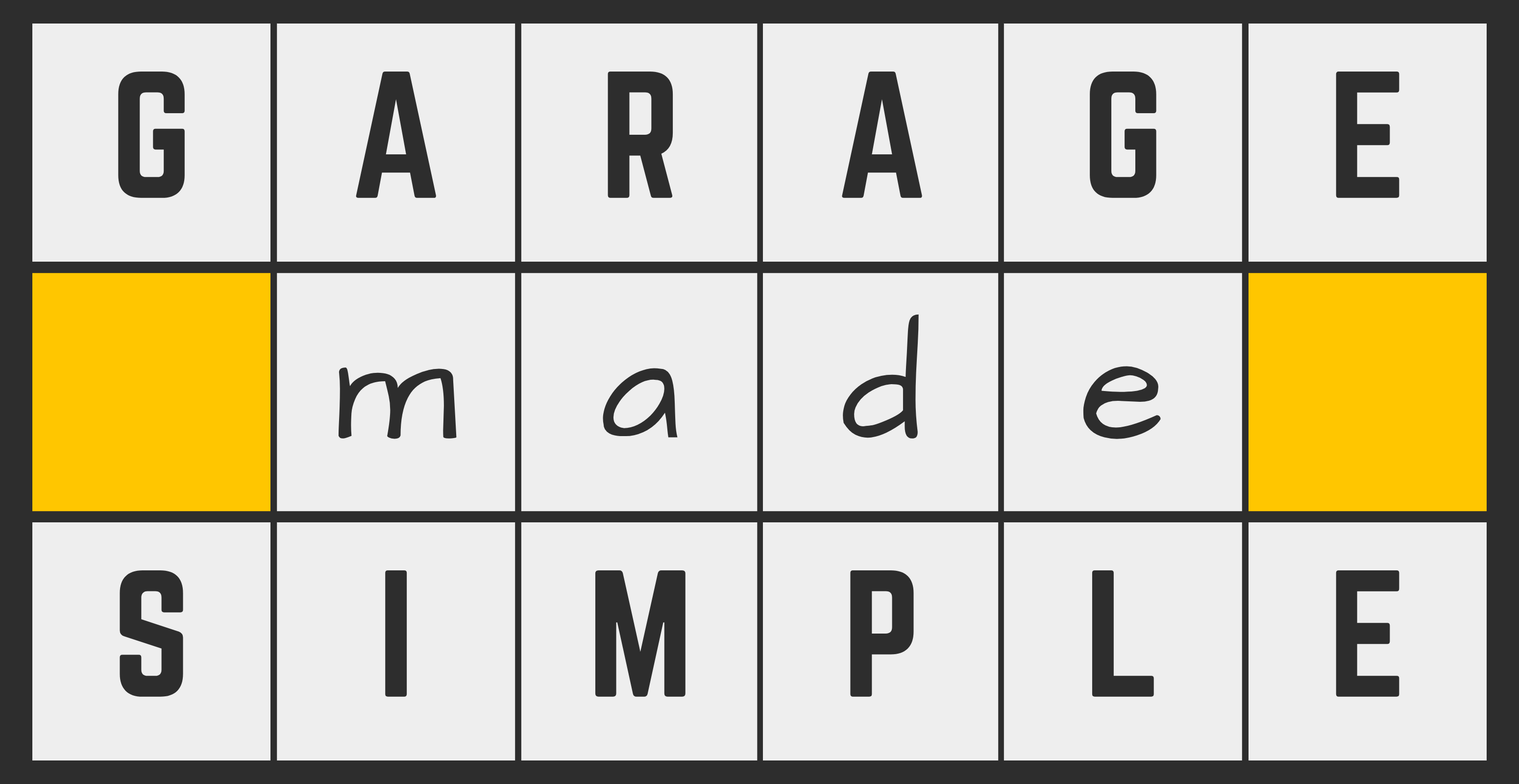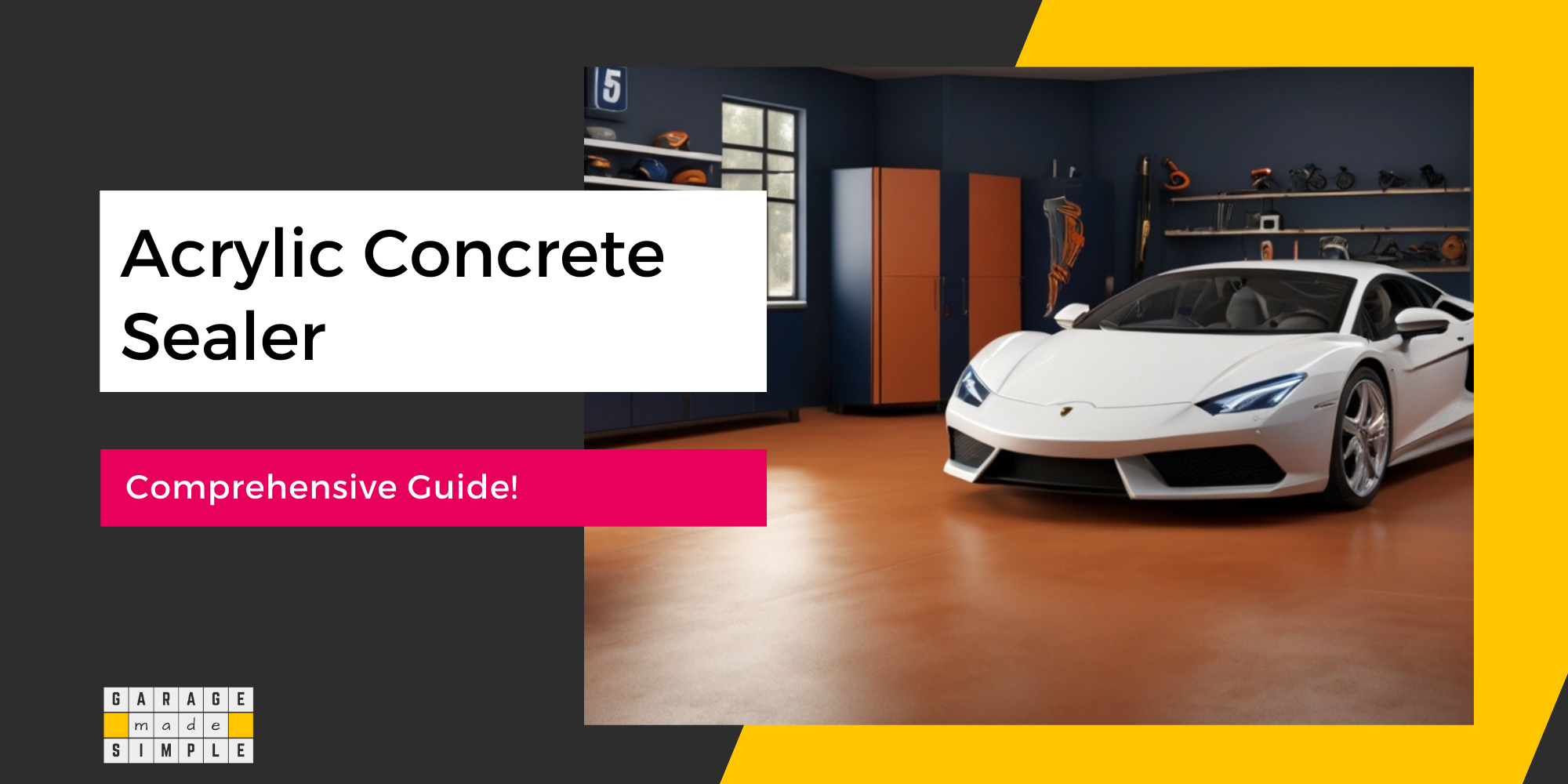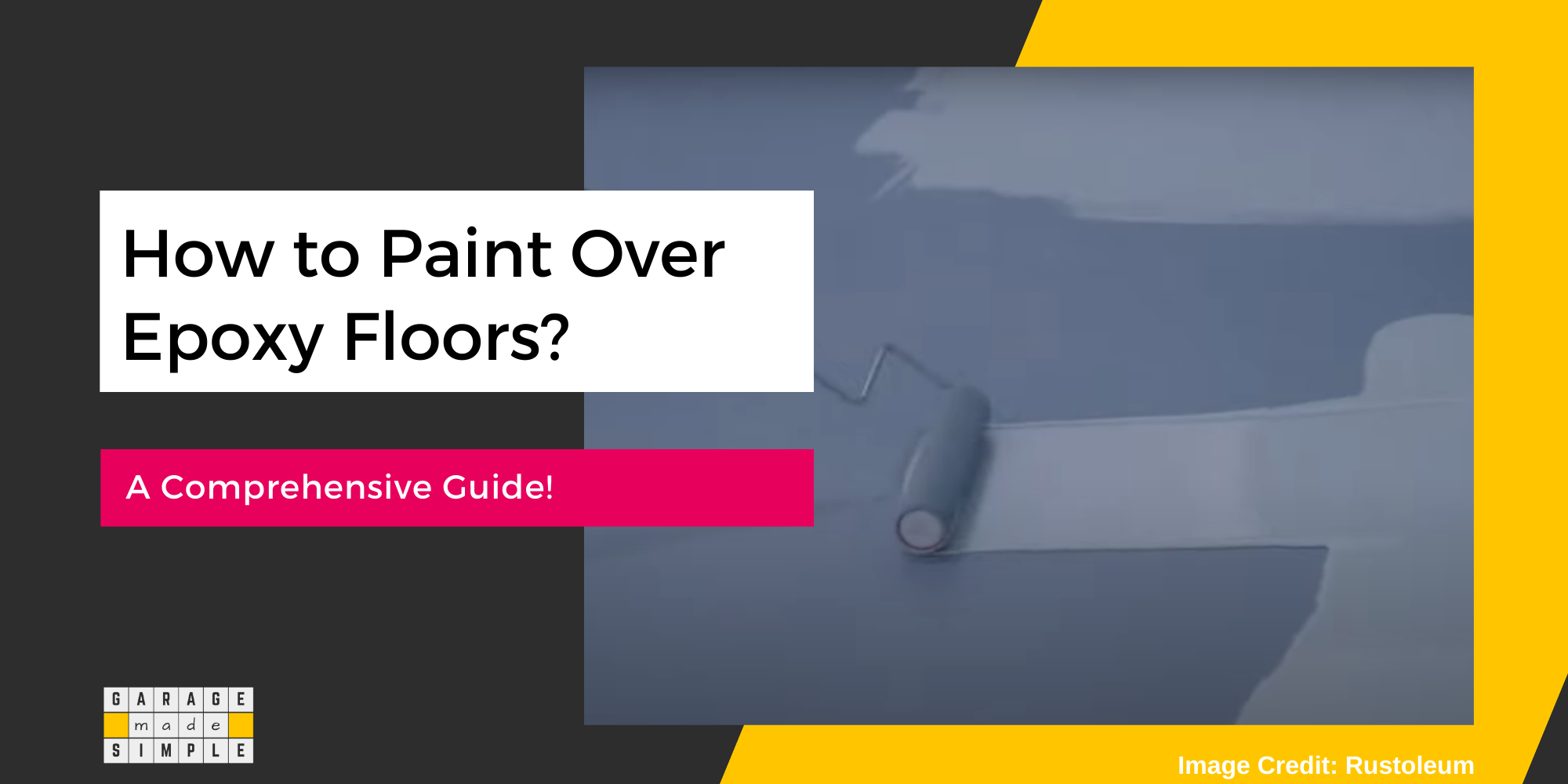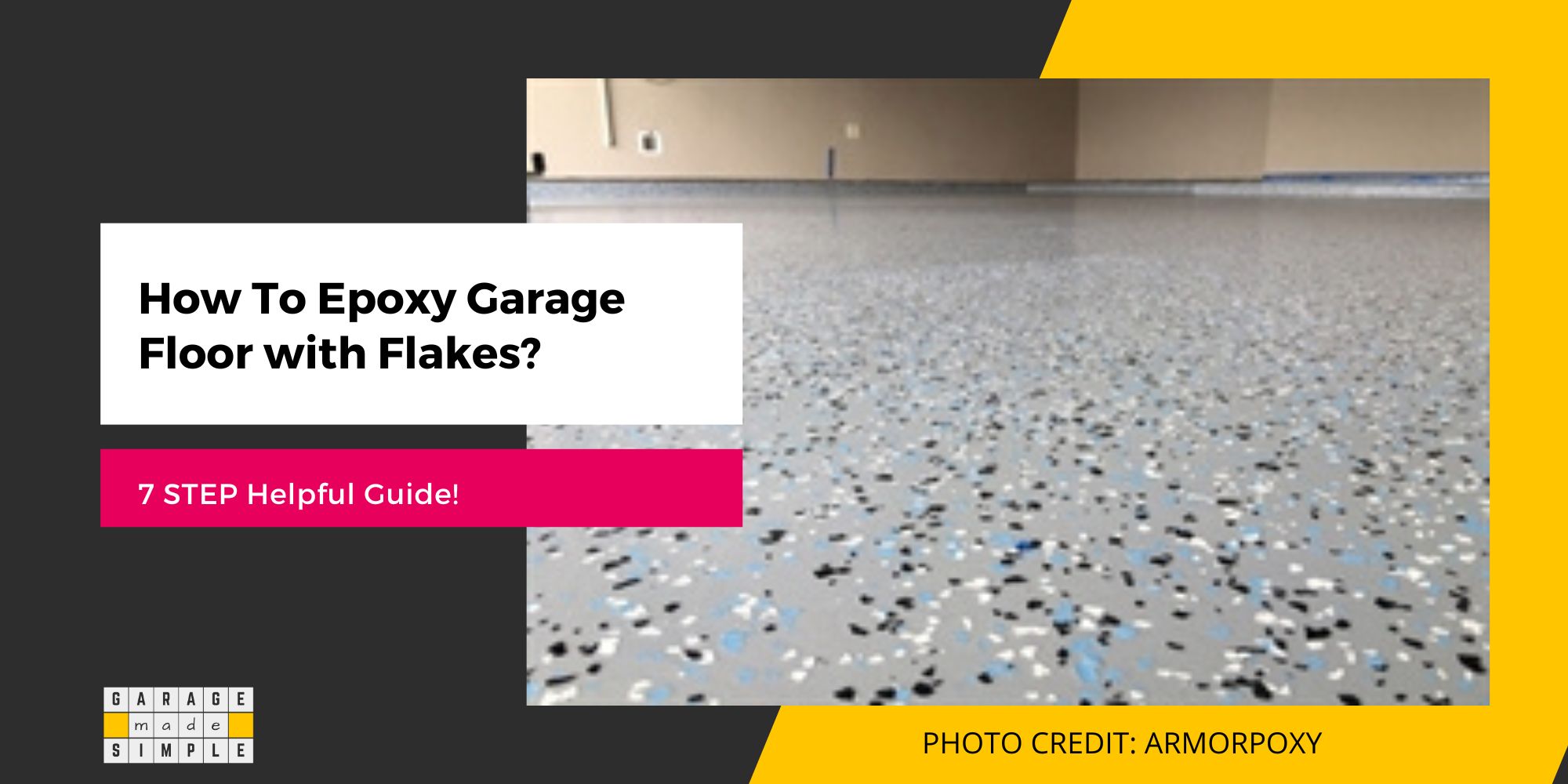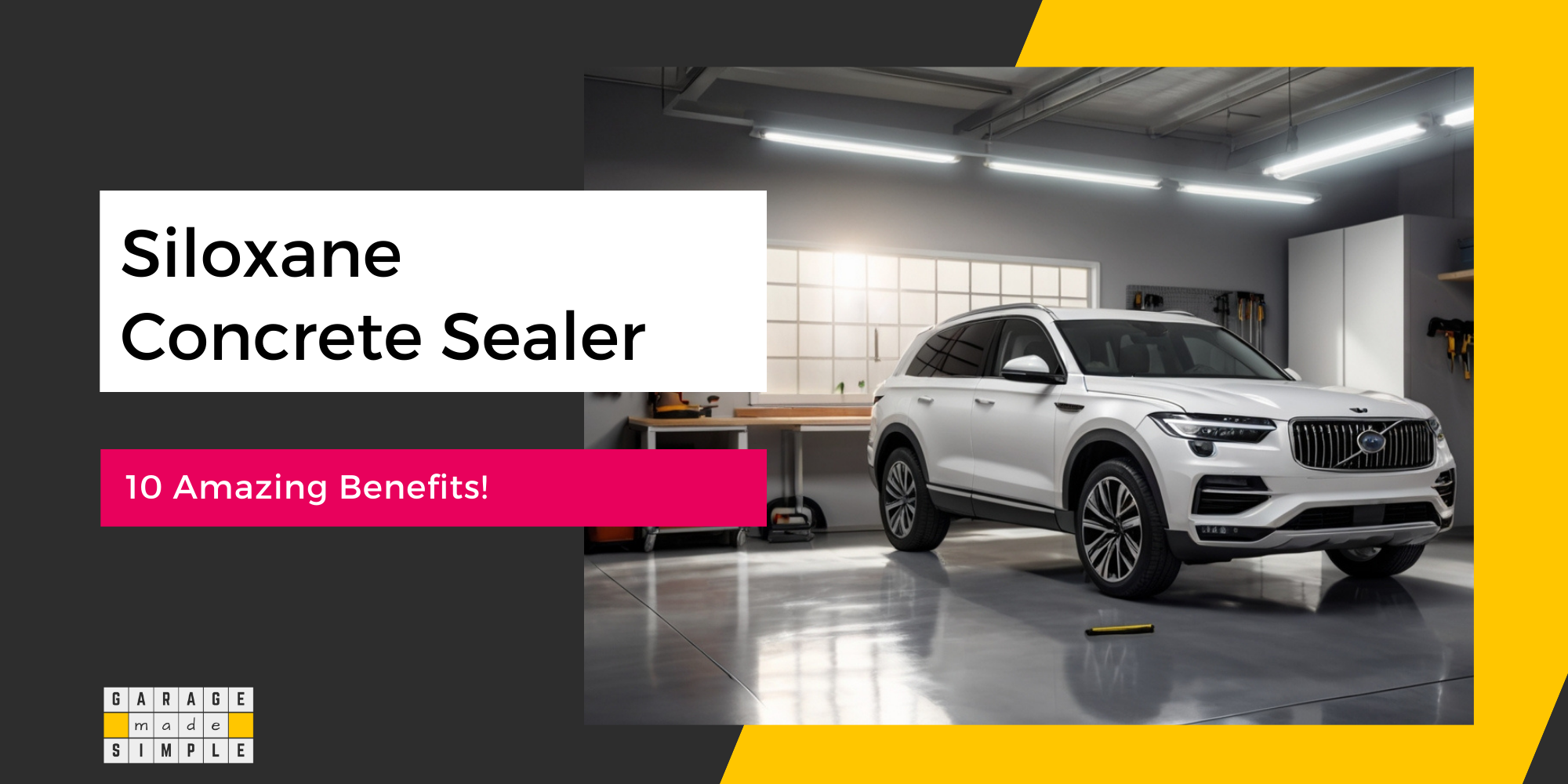5 Types of Concrete Sealers for Garage Floors: A Comprehensive Guide!
As an Amazon Associate, I earn from qualifying purchases.
Are you planning to seal your garage concrete floor? Do you know that there are different types of Concrete Sealers for Garage Floors? Which one should you pick?

I understand. Sealers and their chemistry can be daunting to say the least.
In this blog post, I walk you through the 5 different types of Concrete Sealers for Garage Floors, giving simple explanations and expert advice and insights to help you make an informed decision.
Types of Concrete Sealers for Garage Floors
Different types of Concrete Sealers for Garage Floors refer to the different formulations available to protect and enhance concrete. These sealers include acrylic, penetrating, epoxy, polyurethane, and polyaspartic options.
Each type of sealer has specific benefits and features. By understanding the characteristics of these sealers, you can choose the one that best suits your needs, ensuring long-lasting protection and an appealing finish.
Here is an easy cheat sheet with the key takeaways:
Key Takeaways
| Sealer Type | How They Work | Primary Uses | Type of Finish | Performance |
|---|---|---|---|---|
| Acrylic Sealer | Forms a protective film on the surface, preventing water penetration. | Garage floors, decorative surfaces | Glossy or satin finish | Good protection against water damage, UV rays, and color fading. |
| Penetrating Sealer | Penetrates the concrete, filling the pores and forming a barrier. | Garage floors exposed to freeze-thaw cycles, heavy traffic | Preserves natural look | Excellent protection against water penetration, salt damage, and deicing chemicals. |
| Epoxy Sealer | Chemically reacts to form a strong coating on the concrete surface. | Commercial and industrial garage floors | High-gloss finish | Highly durable and resistant to chemicals, oil, grease, and heavy traffic. |
| Polyurethane Sealer | Forms a flexible film, providing resistance to UV rays, water, chemicals, and abrasion. | Both residential and commercial garage floors | Glossy or satin finish | Superior protection and enhanced appearance. |
| Polyaspartic Sealer | Offers exceptional resistance and rapid curing time. | Ideal for high-demand areas | Clear, glossy finish | Excellent performance and quick turnaround time. |
Let’s take a closer look at each one:
1. Acrylic Concrete Sealer
Acrylic Concrete Sealers are a popular choice for both residential garage floors and decorative concrete surfaces. These sealers work by forming a protective film on the surface of the concrete.
Topical acrylic sealers form a barrier, preventing water penetration and shielding against harmful UV rays. Acrylic sealers are typically applied as a liquid and dry to form a clear or colored film coating.
Acrylic sealers, in addition to protection, also enhance the appearance of the concrete by adding a wet look, glossy or satin finish.
2. Penetrating Concrete Sealer
Penetrating Concrete Sealers work differently from topical sealers. Instead of forming a visible film, they penetrate the concrete and chemically react with it.
Penetrating sealers form compounds that fill the pores of the concrete, creating a protective barrier from within. They are particularly suitable for concrete slabs exposed to freeze-thaw cycles, condensation and heavy traffic.
Penetrating sealers protect the concrete from water penetration, salt, and deicing chemicals while maintaining the natural look of the concrete.
3. Epoxy Concrete Sealer
Epoxy Concrete Sealers are commonly used in commercial and industrial settings due to their exceptional durability and resistance.
Epoxy sealers consist of epoxy resin and a hardener that chemically reacts to form a strong and durable coating on the concrete surface.
Epoxy sealers bond effectively with the concrete, providing excellent resistance to chemicals, oil, grease, and heavy traffic. They offer a glossy finish, enhancing both the strength and aesthetics of the concrete garage floor.
In a sense, an epoxy floor coating performs in the same fashion as an epoxy concrete sealer. For most concrete garage floors an epoxy coating is an excellent choice.
4. Polyurethane Concrete Sealer
Polyurethane Concrete sealers are known for their protective properties and versatility.
Polyurethane sealers form a robust and flexible film on the concrete surface, offering excellent resistance to UV rays, water, chemicals, and abrasion.
Polyurethane sealers are commonly used in both residential and commercial applications. They provide a glossy or satin finish, enhancing the appearance of the concrete while ensuring long-lasting protection.
5. Polyaspartic Concrete Sealer
Polyaspartic Concrete sealers have gained popularity in recent years due to their outstanding performance and quick curing time.
Polyaspartic sealers offer exceptional resistance to UV rays, chemicals, abrasion, and impact. Polyaspartic sealers are particularly useful in high-demand environments where minimal downtime is an important requirement.
Polyaspartic sealers provide a clear, glossy finish and can be applied in a single day, significantly reducing the inconvenience of the sealing process.
How Do Different Types of Concrete Sealers for Garage Floors Work
Understanding how each type of sealer works can help you make an informed decision. Here’s a brief overview of how they work:
Acrylic Concrete Sealer
Acrylic sealers create a protective film on the concrete surface, acting as a barrier against water penetration and shielding against UV rays.
They are applied as a liquid and dry to form a clear or colored coating.
Penetrating Concrete Sealer
Penetrating sealers work by filling the pores of the concrete and chemically reacting with it.
They form a protective barrier from within the concrete, preventing water penetration, salt damage, and the effects of deicing chemicals.
Penetrating sealers do not leave a visible film, preserving the natural look of the concrete.
Epoxy Concrete Sealer
Epoxy sealers consist of epoxy resin and a hardener. When mixed and applied, they chemically react to form a strong and durable coating on the concrete surface.
Epoxy sealers bond effectively with the concrete, providing exceptional resistance to chemicals, oil, grease, and heavy traffic.
Polyurethane Concrete Sealer
Polyurethane sealers form a robust and flexible film on the concrete surface and have superior resistance to UV rays, water, chemicals, and abrasion.
Polyurethane sealers provide a glossy or satin finish, enhancing both the appearance and longevity of the concrete.
Polyaspartic Concrete Sealer
Polyaspartic sealers offer exceptional performance and quick curing time. They have excellent resistance to UV rays, chemicals, abrasion, and impact.
Polyaspartic sealers form a clear, glossy finish and are especially beneficial in environments where fast curing time and minimal downtime are crucial.
Primary Uses of Different Types of Concrete Sealers
Each type of sealer has specific applications where it excels. Here are the primary uses for each sealer:
Acrylic Concrete Sealer
Acrylic sealers are commonly used for residential and decorative concrete surfaces. They provide protection against water damage, UV rays, and color fading.
Moreover, they enhance the appearance of the concrete by adding a glossy or satin finish.
Penetrating Concrete Sealer
Penetrating sealers are suitable for concretes exposed to freeze-thaw cycles and heavy traffic. They protect the concrete from water penetration, salt, and deicing chemicals.
It is best to use penetrating sealers on a new concrete so that the porosity of the concrete is significantly reduced. Penetrating sealers preserve the natural look of the concrete while offering long-lasting protection.
Epoxy Concrete Sealer
Epoxy sealers are hard wearing and abrasion resistant. No wonder they find widespread use on garage, warehouse factory and commercial floors.
Epoxy sealers have excellent resistance to chemicals, oil, grease, and heavy traffic, making them ideal for high-demand areas. These sealers provide a durable and glossy finish, which are easy to clean and maintain.
However, epoxy sealers have poor UV resistance and should not be used on driveways, walkways, patios, etc. unless they are coated with an UV resistant PU topcoat.
Polyurethane Concrete Sealer
Polyurethane sealers are versatile and are better than epoxy concrete sealers when it comes to flexibility and UV resistance.
PU sealers provide exceptional protection against UV rays, water, chemicals, and abrasion. However, they are softer and have relatively poor resistance to abrasion from grit.
Polyurethane sealers typically can be glossier than other options. However, overall a PU concrete sealer is not a great option for a concrete garage floor where car tires create high abrasion.
Polyaspartic Concrete Sealer
Polyaspartic sealers are popular for environments where fast curing time and minimal downtime are essential. They offer excellent resistance to UV rays, chemicals, abrasion, and impact.
Polyaspartic sealers result in a clear, glossy finish and are particularly suitable for high-demand areas.
Type of Finish
Different types of concrete sealers can result in somewhat different type of finish. Here’s a summary of the finishes:
Acrylic Concrete Sealer
Acrylic sealers can have a range of gloss levels, right from matt finish to gloss finish. The level of gloss can be adjusted by varying the formulation or adding matting agents to a glossy sealer.
Another way to get a desired gloss level is to blend a glossy sealer with a matt sealer in the required ratio.
Penetrating Concrete Sealer
Penetrating sealers do not leave a visible film or alter the appearance of the concrete. They preserve the natural look of the concrete while offering protection.
Epoxy Concrete Sealer
Epoxy sealers typically create a high-gloss finish, adding a sleek and professional appearance to the Concrete.
The finish can be customized by using different epoxy formulations or adding decorative elements, such as decorative flakes.
Polyurethane Concrete Sealer
Polyurethane sealers in their natural state are typically even glossier than an epoxy sealer. As a result they are often used as a clear topcoat in many applications, such as garage or retail floors.
PU concrete sealers can provide a high gloss or satin finish, based on your preference, enhancing the overall appearance of the floor. The finish adds a touch of elegance while ensuring long-lasting protection.
Polyaspartic Concrete Sealer
Polyaspartic sealers result in a clear, glossy finish that enhances the natural beauty of the concrete. The finish is sleek and professional, adding to the overall aesthetic appeal.
Performance of Different Types of Concrete Sealers
The performance of the sealers is, of course, an important factor to consider when choosing the right sealer for your Concrete project. An important consideration is how long does a sealer last?
Here’s an overview of how each type performs:
Acrylic Concrete Sealer
Topical acrylic concrete sealers provide fairly good protection against water damage, UV rays, and color fading. They come in a range of gloss levels so that you can choose the one that meets your preference and need.
Acrylic Concrete Sealers are typically single pack and water based. This means no need to mix two packs or use solvents that have high volatile organic compounds (VOC).
As a result, acrylic concrete sealers not only provide an attractive finish but are very easy to apply. However, they have lower weather and abrasion resistance and will require more frequent reapplication.
Penetrating Concrete Sealer
Penetrating Concrete sealers are, in my opinion, essential and not an alternative to the other types of Concrete Sealers for Garage Floors. Penetrating Concrete sealer must always be applied on a new concrete.
Penetrating Concrete Sealers work in a fashion different from all other sealers, which are topical sealers. Penetrating Concrete sealers work by permeating into the concrete pores, reacting with the concrete and filling up the pores with inert chemical compounds.
Penetrating Concrete Sealers provide excellent protection against water penetration, salt damage, and deicing chemicals. They work from within.
They provide long-lasting results and require less frequent reapplication. Moreover, they do not alter the appearance of the concrete as they don’t leave a visible film.
Epoxy Sealer
Epoxy sealers are highly durable topical sealers that are resistant to chemicals, oil, grease, and heavy traffic. They provide a strong and long-lasting protective coating.
They are great for interior applications such as garage floors. However, they are not easy to apply as they require extensive surface preparation, mixing the two packs in the right ratio and skilled application.
Polyurethane Sealer
In many ways a polyurethane sealer is quite similar to an epoxy sealer. The key difference, due to a different chemistry, is that PU sealers form a softer, but a more flexible and UV resistant film than epoxy sealers.
Polyaspartic Sealer
Actually, polyaspartic sealers are basically a subset of PU sealers where the basic chemistry is slightly modified. As a result polyaspartic sealers have exceptional performance characteristics, including rapid curing time.
Though quite an expensive alternative, it can be considered if the project requires quick turnaround. They have excellent resistance to UV rays, chemicals, abrasion, and impact but require skilled application.
Bottom Line
The bottom line is that you do need to consider epoxy, polyurethane or polyaspartic sealers for your concrete garage floor. They are much too expensive and require skilled application.
The best concrete sealers for concrete garage floors are:
Penetrating Concrete Sealer: Apply it after your new concrete garage floor has cured and reapply every 5 – 7 years.
Topical Acrylic Concrete Sealer: Apply it after applying the penetrating concrete sealer. Check its efficacy once a year, preferably in late fall, and reapply if required.
NOTE: A better idea is to replace the Topical Acrylic Concrete Sealer with an Epoxy Floor Coating.
Thank you very much for reading the post. I do hope you found it informative and useful.
